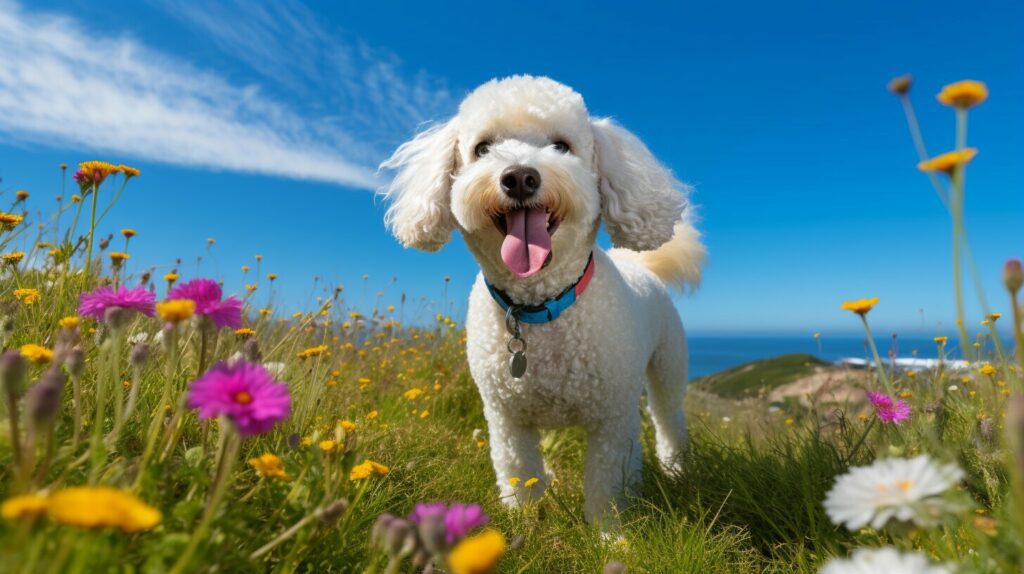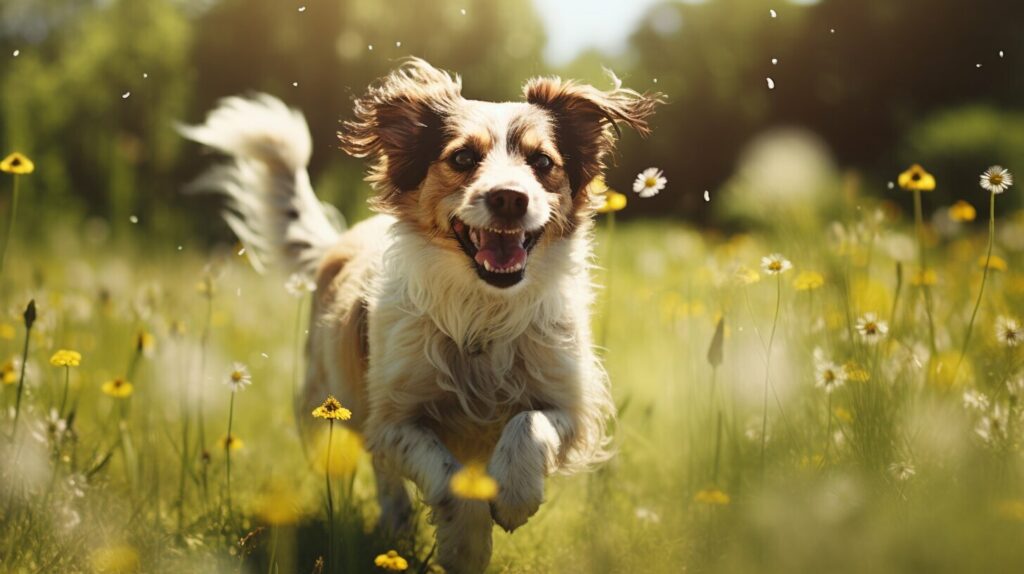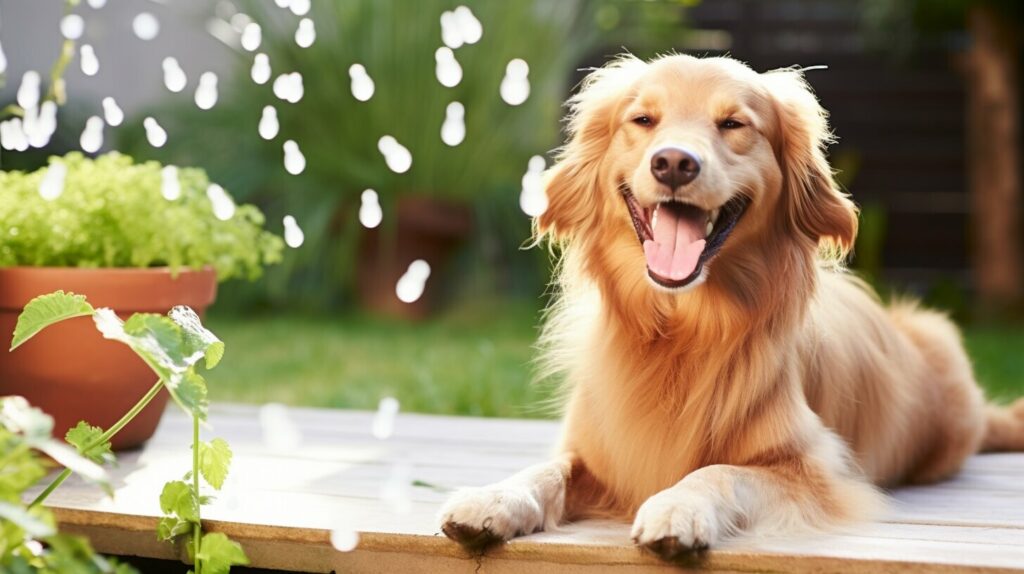As dog owners, we want nothing but the best for our furry companions. One aspect of their health that often gets overlooked is the condition of their coat. A shiny and healthy coat not only looks good but also indicates overall well-being. Unfortunately, dandruff in dogs is a common issue that can impact their coat and cause discomfort. In this article, we will explore effective solutions for treating and preventing dandruff in dogs.
Key Takeaways:
- Dogs can experience dandruff, which can affect the health of their coat and overall well-being.
- There are various causes of dandruff in dogs, including dry skin, allergies, poor nutrition, and underlying health conditions.
- It is important to identify and treat dandruff in dogs to prevent discomfort and further health issues.
Understanding Dog Dandruff
As a dog owner, it’s normal to worry about your furry friend’s well-being. One common issue that can affect your dog’s comfort and appearance is dandruff. Dog dandruff is the presence of flaky skin and scales on your dog’s coat or skin, and it can have several causes.
The most common causes of dog dandruff are dry skin, allergies, poor nutrition, and underlying health conditions. Dogs with naturally dry skin or those living in dry environments are more prone to dandruff. Allergies to food, pollen, or fleas can also lead to dandruff in dogs. Nutritional deficiencies or imbalances, such as a lack of omega-3 fatty acids or too much fat in the diet, can also trigger dandruff. Finally, underlying health conditions like hypothyroidism, Cushing’s disease, or bacterial infections can cause canine dandruff.
It’s worth noting that dog dandruff differs from human dandruff in several ways. While human dandruff is primarily caused by an excess of oil on the scalp, dog dandruff is more often a symptom of an underlying issue. Additionally, while human dandruff is usually harmless, dog dandruff can lead to severe itching, skin irritation, and even infections if left untreated.
Understanding Dog Dandruff
| Cause | Symptoms |
|---|---|
| Dry skin | Flaky skin, often more noticeable in winter or in arid climates |
| Allergies | Itching, redness, inflammation, and flaking |
| Poor Nutrition | Flaky, dry skin, and a dull coat |
| Underlying health conditions | Flaky skin, patches of hair loss, and sometimes open sores or scabs |
“The most common causes of dog dandruff are dry skin, allergies, poor nutrition, and underlying health conditions.”
If you notice your dog exhibiting signs of dandruff, it’s crucial to identify the specific cause to treat it effectively. Sometimes, the solution can be as simple as a change in diet or environment. In other cases, it might require medication and veterinary intervention.
Identifying Dandruff in Dogs
If you notice your dog scratching excessively or have noticed flaky patches on their skin, they may be suffering from dandruff. Dandruff is a common condition in dogs that can affect any breed or age. It occurs when the skin cells on a dog’s coat shed excessively, causing irritation and discomfort. Identifying dandruff in dogs is crucial to address it promptly and prevent it from worsening.
Here are some signs and symptoms to look out for:
- Flaky skin: Small white flakes or scaly patches on your dog’s skin or coat.
- Itchiness: Your dog may be scratching and biting at their skin more than usual.
- Dull coat: A lack of shine and luster in your dog’s fur could be a sign of dandruff.
- Skin irritation: Redness, inflammation, or hotspots on your dog’s skin may indicate dandruff.
If you suspect your dog has dandruff, it’s essential to differentiate it from other skin conditions. Some skin conditions, such as skin infections or parasites, share similar symptoms to dandruff. Therefore, it’s best to consult your veterinarian to obtain an accurate diagnosis.
Fortunately, there are a variety of dog dandruff remedies that can help alleviate symptoms and improve your dog’s coat health. Some natural remedies you can try at home include:
- Oatmeal baths: Soaking your dog in an oatmeal bath can help soothe irritated skin and reduce dandruff.
- Coconut oil: Applying coconut oil to your dog’s skin can help moisturize and reduce dandruff.
- Aloe vera: Applying aloe vera to your dog’s skin can help soothe and moisturize the skin, reducing dandruff and itchiness.
- Omega-3 fatty acid supplements: Adding omega-3 supplements to your dog’s diet can help improve skin health and reduce dandruff.
However, for severe or persistent cases of dandruff, it may be necessary to seek veterinary advice. Your vet may recommend medicated shampoos or topical treatments to manage your dog’s dandruff effectively. Additionally, they can provide further guidance on how to maintain your dog’s coat health to prevent dandruff from reoccurring.
Dog Dandruff Treatment Options
If your dog has dandruff, there are several treatment options that can help alleviate the condition and promote a healthier coat. Here are some of the most effective dog dandruff treatments:
| Treatment | How it works |
|---|---|
| Medicated shampoos | These contain antifungal and antibacterial ingredients that help eliminate dandruff-causing organisms on your dog’s skin. |
| Dietary changes | Feeding your dog a balanced diet rich in essential fatty acids and vitamins can improve skin health and combat dandruff. |
| Supplements | Adding supplements such as omega-3 fatty acids and vitamin E can help reduce inflammation and improve skin elasticity, reducing flakiness. |
| Topical treatments | These can include natural remedies such as aloe vera or coconut oil, applied directly to your dog’s skin to soothe irritation and moisturize dry skin. |
It’s important to note that different treatments may work better for different dogs, depending on the severity of their dandruff and any underlying health conditions. It’s best to consult with a veterinarian to determine the most effective treatment plan for your furry companion.
If your dog’s dandruff persists despite treatment or is accompanied by other concerning symptoms such as extreme itching or severe skin irritation, it’s important to seek veterinary advice as soon as possible.
Natural Remedies for Dog Dandruff
While there are various dog dandruff treatments available, many pet owners prefer to use natural remedies to alleviate this condition. Natural remedies can be cost-effective, easy to administer, and have fewer side effects than some medicated products. Here are some natural remedies that can help manage dog dandruff:
- Oatmeal Baths: Oatmeal is known for its soothing and moisturizing properties that can benefit a dog’s skin. You can grind oatmeal into a fine powder and mix it with warm water to create a bath for your dog. Soak your dog in the oatmeal bath for 10-15 minutes and rinse thoroughly.
- Coconut Oil: Coconut oil is an excellent natural moisturizer that can help soothe dry, flaky skin in dogs. Apply a small amount of coconut oil directly to your dog’s skin and massage gently. Avoid applying too much oil, as it can make your dog’s coat greasy.
- Aloe Vera: Aloe vera has anti-inflammatory and antimicrobial properties that can help reduce skin irritation and infection in dogs. You can apply aloe vera gel directly to your dog’s skin or mix it with a carrier oil, such as coconut oil, and apply it as a moisturizer.
- Omega-3 Fatty Acid Supplements: Omega-3 fatty acids can help improve the overall health of a dog’s skin and coat. You can add omega-3 supplements to your dog’s diet or give them fish-based treats.
It’s important to note that natural remedies may not work for all dogs, and some may have allergic reactions to certain substances. It’s best to consult with your vet before trying any new natural remedy on your dog.
Best Dog Dandruff Products
If your dog suffers from dandruff, you want to give them relief as soon as possible. Fortunately, there are many effective dog dandruff products on the market that can help soothe your pet’s itchy and dry skin. Based on our research and customer reviews, we’ve compiled a list of the best dog dandruff products to help you choose the right one for your furry friend.
Dog Dandruff Shampoo
The first and most important product to consider is a dog dandruff shampoo. These shampoos are specially formulated to treat and prevent dandruff, while also keeping your dog’s coat clean and healthy. Look for a shampoo that contains natural ingredients such as oatmeal, aloe vera, or tea tree oil, as these can help soothe your dog’s skin and reduce irritation.
| Product Name | Description |
|---|---|
| Earthbath Oatmeal & Aloe Shampoo | This all-natural shampoo is made with colloidal oatmeal and aloe vera to soothe dry and itchy skin, while also leaving your dog’s coat soft and shiny. |
| Veterinary Formula Clinical Care Antiparasitic & Antiseborrheic Medicated Shampoo for Dogs | This medicated shampoo contains salicylic acid and coal tar to fight dandruff, as well as relieve symptoms of parasitic and fungal infections. |
| Wahl Pet Friendly Waterless No Rinse Shampoo | If your furry friend isn’t a fan of baths, this waterless shampoo is a great option. It contains plant-based ingredients to cleanse and condition your dog’s coat, without the need for water. |
Conditioner and Moisturizers
After using a dog dandruff shampoo, it’s important to follow up with a conditioner or moisturizer to keep your pet’s skin and coat hydrated and healthy. Look for products with natural ingredients like shea butter, coconut oil, or honey to help soothe and nourish your dog’s skin.
| Product Name | Description |
|---|---|
| Burt’s Bees for Dogs Natural Oatmeal Conditioner with Colloidal Oat Flour and Honey | This conditioner is made with natural ingredients like oat flour and honey to soothe and soften your dog’s coat, while also nourishing their skin. |
| Pet MD Chlorhexidine Wipes with Ketoconazole and Aloe for Dogs and Cats | These wipes contain chlorhexidine and ketoconazole to fight bacteria and fungus, as well as aloe vera to soothe irritated skin. |
| PetHonesty 10-in-1 Dog Multivitamin with Glucosamine | While not a topical product, this multivitamin contains essential nutrients like omega-3 fatty acids and biotin to promote healthy skin and coat, and help reduce dandruff. |
No matter which product you choose, it’s important to follow the instructions carefully and use them as directed. If your dog’s dandruff doesn’t improve, or if they develop other symptoms like redness, inflammation, or hair loss, be sure to consult your veterinarian for further advice.
Preventing Dog Dandruff
While dandruff in dogs can have various causes, you can take several precautions to minimize its occurrence. Some effective preventive measures are:
- Regular grooming: Brush your dog’s coat regularly to remove dead skin cells, dirt, and debris. Use a soft-bristled brush or comb that doesn’t irritate their skin.
- Balanced diet: Feed your dog a balanced diet that meets their nutritional needs. Poor nutrition can result in dry and flaky skin, making them prone to dandruff. Consult a veterinarian for dietary recommendations.
- Proper hydration: Provide your dog with fresh water at all times to prevent dehydration, which can cause dry skin.
- Environmental considerations: Keep your dog’s environment clean and free of allergens, such as dust, pollen, and mold. Use air purifiers or filters if necessary, and avoid exposing them to extreme temperatures.
By following these tips, you can help maintain a healthy coat for your furry friend and minimize the risk of dandruff.
When to Seek Veterinary Advice
If your dog’s dandruff persists despite your efforts to alleviate it, or if you notice other concerning symptoms alongside dandruff, it may be time to consult a veterinarian. Some skin conditions or underlying health issues can mimic dandruff, and only a professional evaluation can determine the root cause of your dog’s skin problems.
A veterinarian can recommend specific dog dandruff treatments based on your dog’s breed, age, and overall health. They may also run tests to rule out any underlying conditions that could be causing dandruff, such as bacterial or fungal infections, hormonal imbalances, or allergies. In some cases, prescription medications or topical treatments may be necessary.
If your dog has severe skin irritation, such as redness, swelling, or open wounds, don’t wait to seek veterinary advice. These symptoms can indicate a more serious skin condition that requires immediate attention.
Overall, it’s important to monitor your dog’s skin health regularly and seek veterinary advice when necessary to ensure their optimal well-being.
Managing Chronic Dog Dandruff
If your dog has chronic dandruff, it is essential to develop a long-term treatment plan to manage the condition and alleviate symptoms. Here are some strategies to help you manage your dog’s dandruff:
- Regular grooming: Consistent grooming can help remove excess dead skin and distribute healthy oils throughout your dog’s coat. Brushing your dog’s fur regularly can also prevent matting and tangles that can make dandruff worse.
- Supplements: Omega-3 fatty acids and vitamin E supplements can help reduce inflammation and promote healthy skin and coat in dogs.
- Avoiding allergens: If your dog’s dandruff is caused by allergies, identifying and avoiding the allergens can help minimize symptoms. Consult with your vet to determine the cause of your dog’s allergies.
Additionally, it is crucial to have regular veterinary check-ups to monitor your dog’s dandruff and overall skin health. Your veterinarian may recommend additional treatment options or make adjustments to your treatment plan as needed.
Remember that managing chronic dandruff in dogs is a long-term process, and it may take time to see improvements. Be patient, consistent, and attentive to your dog’s needs and condition.
Conclusion
Chronic dandruff in dogs can be a challenging condition to manage, but with proactive treatment and lifestyle adjustments, you can help your dog alleviate symptoms and improve their overall quality of life. By staying informed about the causes and treatment options for dog dandruff, you can develop a comprehensive plan to manage the condition and provide your furry friend with a healthy and happy life.
Maintaining a Healthy Canine Coat
Keeping your dog’s coat healthy is essential in preventing dandruff. Proper grooming techniques and regular bathing can keep your dog’s skin and coat clean and hydrated, minimizing the occurrence of dry skin and flakes. Additionally, feeding your dog a balanced diet with plenty of omega-3 fatty acids can promote overall skin and coat health, providing essential nutrients that can reduce inflammation and irritation in the skin.
When it comes to dog dandruff treatment, there are several products that can help maintain a healthy coat and reduce flaky skin. Medicated shampoos specifically designed for treating dandruff can be used every few weeks to keep your dog’s skin clean and moisturized. Conditioning treatments and moisturizers that contain natural oils like coconut oil or aloe vera can also be applied to your dog’s coat to reduce dryness and irritation.
For the best dog dandruff products, consider opting for shampoos and conditioners that are free of harsh chemicals, synthetic fragrances, and dyes. Look for products that contain natural ingredients like oatmeal, tea tree oil, or chamomile, which can reduce inflammation and soothe dry, itchy skin.
Regular visits to the groomer can also help maintain a healthy coat for your dog. Professional grooming not only keeps your dog looking and smelling great, but it can also help identify any underlying skin conditions early on, giving you the opportunity to treat them before they worsen.
Overall, maintaining a healthy coat for your dog requires a combination of proper grooming, nutrition, and the use of the best dog dandruff products. Consistently following these tips can help keep your dog’s skin and coat healthy, preventing the occurrence of dandruff and promoting overall well-being.
Conclusion
Caring for your dog’s coat is an essential part of keeping them healthy and happy. Dandruff can be a nuisance, but with the right knowledge and tools, you can effectively manage and prevent it.
Remember to regularly groom your dog, provide them with a balanced diet and proper hydration, and use high-quality dog dandruff products as recommended by your veterinarian. Incorporating natural remedies, such as oatmeal baths and omega-3 supplements, can also help alleviate symptoms and promote coat health.
If your dog’s dandruff persists despite your efforts, or if you notice any concerning symptoms, don’t hesitate to seek veterinary advice. Remember, early detection and treatment can make all the difference in maintaining your dog’s overall well-being.
With a little bit of care and attention, you can help your furry friend enjoy a healthier, shinier coat and a happier life.
FAQ
Q: What causes dandruff in dogs?
A: Dog dandruff can be caused by dry skin, allergies, poor nutrition, or underlying health conditions.
Q: How can I identify dandruff in my dog?
A: Look for signs such as flaky skin, itchiness, and a dull coat. Differentiate dandruff from other skin conditions in dogs.
Q: What are the treatment options for dog dandruff?
A: Treatment options include medicated shampoos, dietary changes, supplements, and topical treatments. Consult a veterinarian if necessary.
Q: Are there any natural remedies for dog dandruff?
A: Yes, natural remedies like oatmeal baths, coconut oil, aloe vera, and omega-3 fatty acid supplements can help alleviate dandruff in dogs.
Q: What are the best dog dandruff products?
A: Recommended products include medicated shampoos, conditioners, and moisturizers specifically designed to treat and prevent dog dandruff.
Q: How can I prevent dog dandruff?
A: Regular grooming, a balanced diet, proper hydration, and environmental considerations can help minimize the occurrence of dog dandruff.
Q: When should I seek veterinary advice for dog dandruff?
A: Consult a vet if dandruff persists despite treatment, if there is severe skin irritation, or if other concerning symptoms are present.
Q: How can I manage chronic dog dandruff?
A: Strategies for managing chronic dandruff include long-term treatment plans, lifestyle adjustments, and regular veterinary check-ups.
Q: How can I maintain a healthy canine coat?
A: Proper grooming techniques, regular bathing, and nutrition are key to maintaining a healthy coat in dogs. Use recommended products for coat health.



